- Home
- Sabrina Paige
Silas Page 4
Silas Read online
Page 4
We are a motley crew, I thought, a group of reformed con artists still conning. But for the greater good. It was silly. Laughable. But we were who we were. My parents always said you could take a con out of the game, but you'd never take the game out of the con.
I was who I was. I did things my way, not my parents' way. They saw everyone as a mark, no matter what. And if you had a vulnerability, it made you a better target. My parents abhorred weakness.
When I turned eighteen, I vowed to do things differently - to use my skills only on people who deserved it. It wasn't until I'd gotten together with Iver and Emir and Oscar that everything had fallen into place.
Iver spoke, his voice insistent. “I never said we should pursue him,” he said. “In fact, we should set the bar higher for him.”
“Make him jump through more hoops,” Oscar said, raising his glass.
“Please don't tell me that you think this is a good idea, Oscar,” I said. “You're always the voice of reason. We don’t take excessive risks. You taught me that. We can regroup and figure out something else - Emir can hack his accounts.”
"Hacking is too risky," Emir said.
“You should listen to what Iver has to say,” Oscar said. “When we got your text, we discussed other possibilities.”
“This is mutiny,” I said.
Iver tossed his head back, laughing. “Mutiny?” he asked. “Are you suggesting you're the captain of this ship?”
“I always thought of myself as the captain,” Emir said, and Iver gestured toward him, with an impish grin.
“See?" Iver asked. "You’ve hurt Emir’s feelings. Besides, three days ago, you were set on bringing the promoter down. Suddenly you want to cut and run?”
I flushed. The truth was, seeing Silas had me spooked. I was trying not to be superstitious, but seeing him had to be some kind of sign.
It wasn't a good omen, someone just coming out of my past like that.
“I don't want to cut and run,” I lied. “I want to walk away, and live to grift another day. A wise old man taught me that.” I looked meaningfully at Oscar, who stood with his elbow on the grand piano, the picture of a harmless sweater-clad retiree. In reality, he was a brilliant strategist and one of the most successful long con artists of the last century.
“Well,” Oscar said. “I think this is a viable option.”
“Okay.” I sighed. “What’s the plan? Sell me on it.”
“The promoter embarrassed himself,” Iver said. "His fighter was worthless. You were hunting talent before, and investors for a legitimate television channel, but maybe you’re not hunting for talent. Maybe you’re really looking for the opposite of talent.”
“Guys to take a fall,” I said.
“More than just a fall,” Iver said. “What if you're actually looking for fighters for a private no-rules network, right? Maybe it’s the ultimate in no rules. Totally off the books.”
“Snuff?” I asked, shaking my head.
"I wouldn't sell it that way," Iver said. "A gladiator channel. The real kind of gladiator. A fight to the death."
"So, snuff," I repeated.
Iver made a tsk-tsk sound. "Potato, po-tah-toh," he said.
“Coker would probably be more than happy to provide the product for something like that,” I admitted.
“It’s also dirtier,” Iver said. “Which means involvement would be more expensive. Riskier.”
“Better for us,” Oscar said, winking at me.
“Which means more money. A bigger payoff. How much?” I asked, looking at Emir.
Emir smiled. “I’ve been going through his financials,” he said. “We can go higher.”
There was something sick about the thrill that rushed through me at the prospect of upping the ante, taking a larger risk. It must be the same kind of rush gamblers get, I thought.
But it was the right thing to do, I told myself. Coker was the ultimate dirtbag. And then there was the matter of Iver's housekeeper's husband - he deserved to be taken care of, after what Coker had done to him.
“Okay,” I said. “I’m game.”
"This is it?" I asked. The tiny house in front of us was surrounded by a small, mostly-brown yard, the only green color coming from the ragged weeds growing up in patches that dotted the dirt. A child's bicycle was propped up against the front steps. On the other side of the street, three men stood in front of an equally depressing home, leaning against a beat-up truck and talking. I could feel their eyes on us as we got out of the car.
"Yeah, man," Trigg said. "It's no good. Johnny and Deborah had to move here a couple months ago. They were able to get out of some of the hospital bills, but it took everything they had."
"Shit. I can't believe they're living in a place like this. I've sent them money, but it wasn’t much, since I owed that money to Fat Harry. I didn’t know it was this bad. Coker should pay for what he did." I exhaled heavily and pocketed the car keys before I looked over at the guys across the street. "Elias is going to fucking kill me if his Mustang gets jacked. He's crazy when it comes to this car."
"Well, it's a sweet car. It makes sense he'd be psychotic about it. We'll watch it from inside," Trigg said. He lifted up the hem of his shirt to reveal the handgun tucked into his waistband. "But I brought this, just in case."
"How's their little girl doing?" I asked, as we walked to the front door.
"She's okay," Trigg said. "Johnny said she's been having some problems at school. But that's no big surprise, if the school is in a neighborhood like this, you know?"
The door opened before we even knocked, and Deborah stood in the doorway, an apron wrapped around her waist. She wiped her hands on the fabric, and waved us inside, glancing behind us at the men across the street. "Silas, Trigg, come in," she said. "What are you doing here?"
We stood awkwardly just inside the doorway of the small house, and Trigg angled himself near a window after giving Deborah a hug. "I'm just going to keep an eye out for the car," he said.
"It's my brother's car," I explained, aware of how it seemed, us driving into this neighborhood in a car like that, like a couple of rich assholes. The truth was that we were far from it.
"It's probably a good idea to watch," Deborah said, shaking her head. "The men there, they're no good. Drugs, I think. A lot of people go in and out of the house."
"Trigg said you moved here a couple months ago," I said. Deborah gestured toward the table and chairs, and I sat while she busied herself in the kitchen, getting glasses and a pitcher of water.
"The hospital bills cleaned us out," she said.
"It happened a year ago, though," I said, shaking my head. "I thought the hospital bills were all taken care of. Johnny had insurance."
"All of the hospital bills were taken care of, the ones from what happened at the fight," Deborah said. "But, months later, he was hiding the problems with dizziness. He was still having - what do they call it? - Vertigo. He couldn't operate heavy machinery, and then he lost his job as the equipment operator at the plant a couple months ago. Everything started going downhill."
"I'm sorry, Deb," I said. "I left and - I didn't know. I'd have sent more, if I could."
She waved her hand dismissively. "Please, Silas," she said. "You've already done so much. After what happened with you..."
"I was lucky," I said, changing the subject. I didn't want a pity party. "What is Johnny doing? Is he okay now?"
Deborah shrugged. "We'll make it," she said. "He's bagging groceries, picking up odd jobs here and there. He still has the dizziness, and migraines. We just needed to downsize a bit. We'll be fine. Tell me about you. How are you doing? Are you back in town to stay? Johnny will be real happy to see you. He's working late today, though."
I shook my head. "I’m just popping in," I said. "I had a fight the other night."
Deborah's face paled. "You're back with Coker?"
"No, no, of course not," I said. "Abel called me to be in his corner for a fight, but he ended up in the hospital, so I too
k his place."
Her hand flew to her mouth, her eyes wide. "Is he okay? Was it Coker?"
I shook my head. "No, no," I lied, throwing a look at Trigg. Deborah didn't need anything else to worry about. "He was in a car accident. It was completely random. He's fine - just bruised up, nothing serious. I'll tell him you asked about him."
"You already did the fight, then?" she asked, her voice shaky.
I reached for her palm, covered her hand with mine. "Yeah," I said. "And I'm fine, too. I kicked the guy's ass."
Deborah patted the back of my hand. "Please watch yourself, Silas," she said. "You were smart to leave when you did. I worry about you and the other fighters."
"I'm good," I said. "We brought you something. The purse from the fight – minus some money I owed someone. Hopefully it'll help."
Trigg took the envelope of cash from inside his jacket and slid it across the table. "It should be enough to get by for a little while. It's not permanent, but..."
Deborah inhaled sharply, bringing her hand to her mouth. "No," she said. "I couldn't possibly accept something like that. Silas, that's yours. You need the money."
"I won't take no as an answer, Deb," I said. "You've been like a mom to me, more than my own mother, and I can't think about you and Johnny struggling like this. It's not right."
"I can't accept your charity, Silas," she said, her voice adamant. "I've got a job, cleaning for this rich guy, and I told him the same when he offered to help. We're not a charity case. We'll figure it out."
"This isn't charity, Deb," I insisted. "It's payback for all the shit you and Johnny have done for me, bailing me out of trouble when I first came out here to Vegas. Or don't you remember cleaning my ass up, getting me back on track?"
"You don't owe us anything, Silas," she said, shaking her head. But I could see her eyes welling up, her resolve weakening.
"Yeah, sure, I don't owe you anything," I said. "Just my life. I don't care what you say, the money stays here. If you don't want to take it, then you can put it away for Cara." I knew that the mention of her daughter's name would make Deborah cave.
She looked at me for a long time before she finally nodded. "Thank you, Silas," she said. "You too, Trigg."
Trigg smiled. "Don't look at me," he said. "This is all Silas' doing."
"I'm glad it's daylight," I said. We hadn't even reached our destination, and the neighborhood was becoming increasingly dangerous-looking.
Iver was distracted, his gaze focused on our surroundings. "Yes," he said absently. "We'd probably get shot here at night."
"The GPS says we're in in the right place," I said. "This is the address Emir pulled." Emir could get virtually any information we needed about the marks and the people we were helping, but there was just something about checking things out in person that always made me feel better about a job. Emir laughed at me, called me superstitious, since his information was never wrong. And in this case, he had pictures of the neighborhood where Iver's housekeeper and her family lived, easily obtained on the internet. But there was just something about seeing it with your own eyes that couldn't be replaced.
Usually I did this kind of thing at the beginning, when we were verifying a victim's story, before we even started a job. But this time, I'd been trying to break old habits, telling myself my compulsions weren't reasonable. When it came down to it, I was a creature of habit. Iver knew it was driving me crazy, the fact that I hadn't already done my drive by. So he'd agreed to come with me.
"Just so you don't get killed," he said. "I've seen the photos from Emir, and I know Deborah. The story is genuine."
I slowed down at the end of the street, within viewing distance from Iver's housekeeper's place. "Did she suddenly come into money?" I asked, nodding toward the shiny Mustang parked in the driveway.
Iver's brow furrowed. "Is that one of Coker's cars?"
I shook my head, mentally running down the checklist of Coker's known vehicles. I had a memory for details like that. "Not that I know of."
We sat in silence for a few minutes, the car engine idling, until Iver spoke. "I'd have brought champagne, if I'd have known we were going to be on a stakeout."
I laughed, recalling the first time Iver and I had worked together. We had been under surveillance, brought on us by a bad deal of Iver’s. But, in typical Iver fashion, he wasn’t worried in the least.
“Chin up, lassie,” Iver said, with a fake Scottish accent and a wink. “It’s not the end of the world, you know.”
I stood at the side of the window, looking down at the unmarked utility van outside of the hotel, the same van that had been sitting there for hours. I didn’t say anything, paranoid that the room might be bugged.
Then Iver turned on his heel, walked across the room toward the bar, and took a bottle of champagne from the ice bucket. Grabbing two champagne glasses, he passed me without a word.
“Champagne? Really? It’s noon, and I hardly think the occasion calls for it,” I said.
“Oh, darling,” Iver said. “It’s not for you.” And he left the room, the door closing hard behind him.
Momentarily stunned, I wondered what the hell he was doing. I watched from the window as he walked toward the utility van, brandishing the champagne bottle and glasses as if he didn’t have a care in the world.
My breath caught in my throat and my hand came to my mouth as he knocked on the back of the utility van and the door opened. He handed the agents the champagne. He said something to them, then walked away as if nothing unusual was happening. Even from where I stood, I could see him whistling as he walked.
When Iver returned, I stood there, open-mouthed, before I started laughing. “What did you say to them?” I asked.
Iver smiled. “I was simply congratulating them on a job well done,” he said. “It’s important to recognize civil servants. They’re often underappreciated.”
The door to the housekeeper's house opened, and I drew in a breath sharply as two men exited the building and walked toward the car.
"Guests," Iver said, looking at me. He paused. "And...wait a minute. You know who they are."
I shook my head, and swallowed hard. "I don't."
"Don't lie to me," he said. "Or have you forgotten I can read people? The expression on your face says it all."
"It's nothing," I said. "No one." I put the car in drive, ready to blow past the two of them and out of there, but I couldn't quite bring myself to do it. Instead, I just sat, my gaze fixed on Silas. I watched him pull open the driver's side door and get inside, and the tail lights came on. When the car backed out of the driveway, I paused.
The little voice inside of my head, the reasonable one, told me it was a stupid idea to follow him.
Don't do it, I thought. Let him go.
"I can see what you're about to do," Iver said. "And if you think for a moment I'm going to let you tail someone who's not involved in this job because of a personal reason, without knowing all of the sordid details, you don't know me well enough at all."
I ignored Iver and rolled the car down the road slowly, far enough behind Silas that he wouldn't see us.
If there was one thing I knew how to do, it was tail someone.
It was one of my lessons when I was growing up. By the time I was eight, I was skilled in the art of pickpocketing. My father had taught me his card tricks, and by ten, I’d mastered poker and could hustle a game of pool. I’d been involved as a prop in most of my parents’ cons, but by adolescence, I was actually good at it.
Really good.
My parents were proud. Deception and evasion were second nature to me. Evading a tail was as instinctive as breathing. Tailing someone without being seen took a little longer.
My upbringing hadn’t exactly been normal. It had been highly unusual. And by unusual, I meant pretty fucked up by most people’s standards. While other kids learned to read and write, I learned the Three Card Monty and the art of pickpocketing.
Some kids learned the Golden Rule, I learned th
e Grifter's Code.

 Prick
Prick Elias
Elias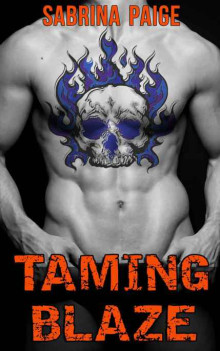 Taming Blaze
Taming Blaze Tool
Tool Prince Albert
Prince Albert Killian
Killian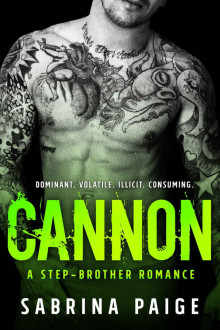 Cannon
Cannon Her Bodyguard
Her Bodyguard Tackled
Tackled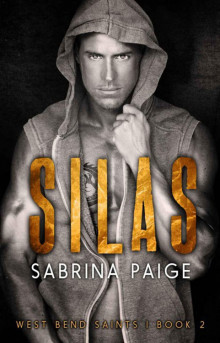 Silas
Silas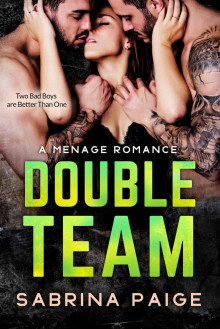 Double Team
Double Team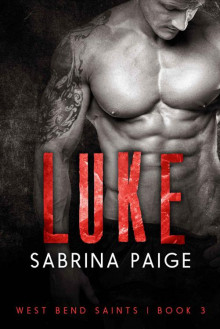 Luke
Luke Prince Albert: A Billionaire Stepbrother Romance
Prince Albert: A Billionaire Stepbrother Romance A Very Dirty Christmas
A Very Dirty Christmas Double Team: A Menage Romance
Double Team: A Menage Romance Killian: A West Bend Saints Romance
Killian: A West Bend Saints Romance Cannon (A Step Brother Romance #3)
Cannon (A Step Brother Romance #3) Tackled: A Sports Romance
Tackled: A Sports Romance